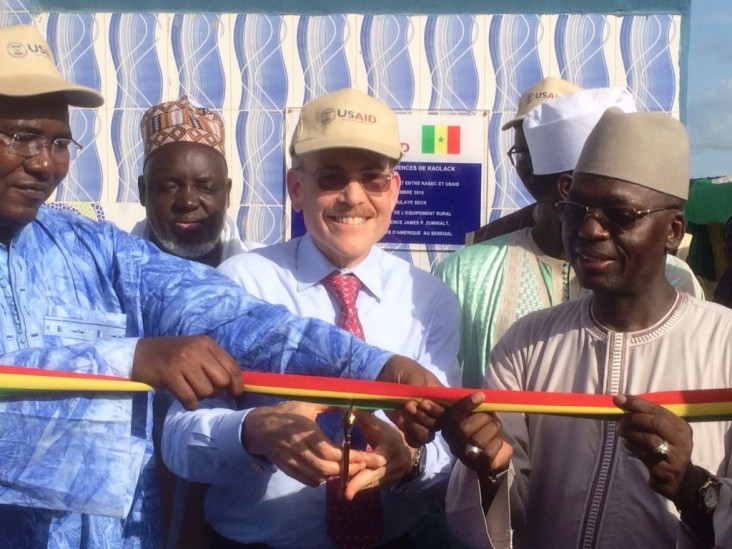
Official opening of Kaolack Seed Treatment Center
For Immediate Release
“Seed quality is the backbone of agricultural productivity,” U.S. Ambassador to Senegal James P. Zumwalt said on September 2 as he joined local authorities and representatives of the agricultural sector to inaugurate a new Seed Treatment Center in Kaolack, Senegal’s breadbasket for cultivation of cereals like millet, maize and sorghum.
“Good seed makes for more resistant crops in areas with irregular rainfall,” Ambassador Zumwalt said, citing last year’s drought in the region, despite which farmers were still able to complete their harvest thanks to the hardy, drought-resistant seeds the center produced.
The already-functional facility specializes in the treatment and conditioning of high quality, “certified” cereal seeds to cover the needs of Kaolack and the surrounding regions of the Saloum.
The center can process 3,000 tons of maize, millet and sorghum per year and has nearly surpassed 2,500 tons in 2015.
To make this project a reality, the U.S. Agency for International Development (USAID) facilitated a cost-shared partnership system dubbed Kaolack Seeds and Cereals (KASEC) owned by two private operators in Kaolack.
The contribution of USAID to the project, as subsidy to the government of Senegal, is a new versatile seed processing and packaging unit with a capacity of 1.5 tons per hour and a 66 KVA generator. USAID also provided KASEC with working capital and helped finance construction of new infrastructure at the site.
USAID support is a strategic investment in Senegal’s agricultural self-sufficiency policy known as the Program for Accelerated Agriculture in Senegal (PRACAS) and the Cereal Corridors project under the Plan Sénégal Emergent that promise to boost grain production and raise farmers’ incomes.
The Kaolack facility is the second of its kind, after the one in Kolda, to be built with USAID assistance. The third center in Richard Toll was rehabilitated with the Agency’s assistance. Together, they will revitalize the seed sector and support the certification system for cereals. The centers complement three USAID-equipped seed laboratories and two research stations, representing a total investment of $1.7 million.
These activities were implemented by the Economic Growth Project (USAID/PCE), which evolved into Feed the Future Senegal Naatal Mbay project in May 2015.
Taken together, these investments will help farmers access certified seeds, see better returns, and rise above the subsistence level thanks to the opportunities that present themselves through the cereal value chains.







Comment
Make a general inquiry or suggest an improvement.